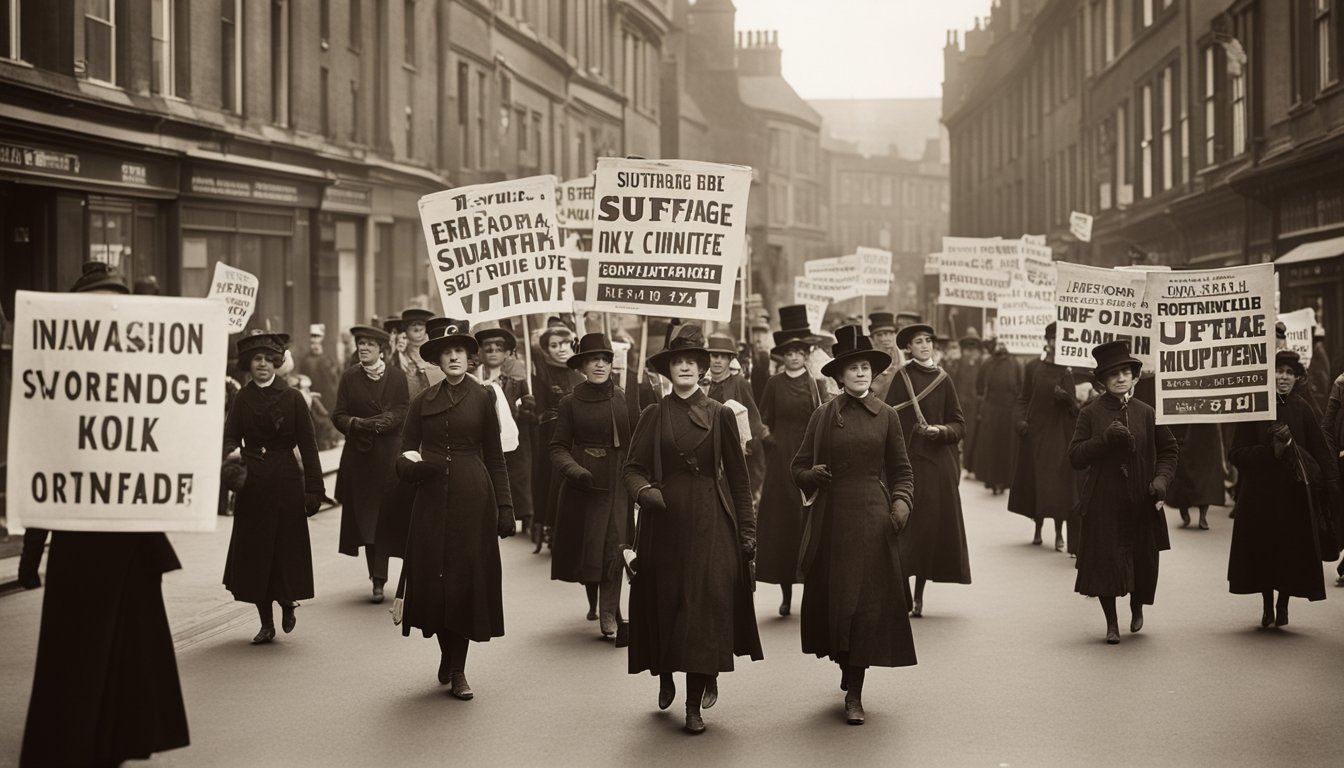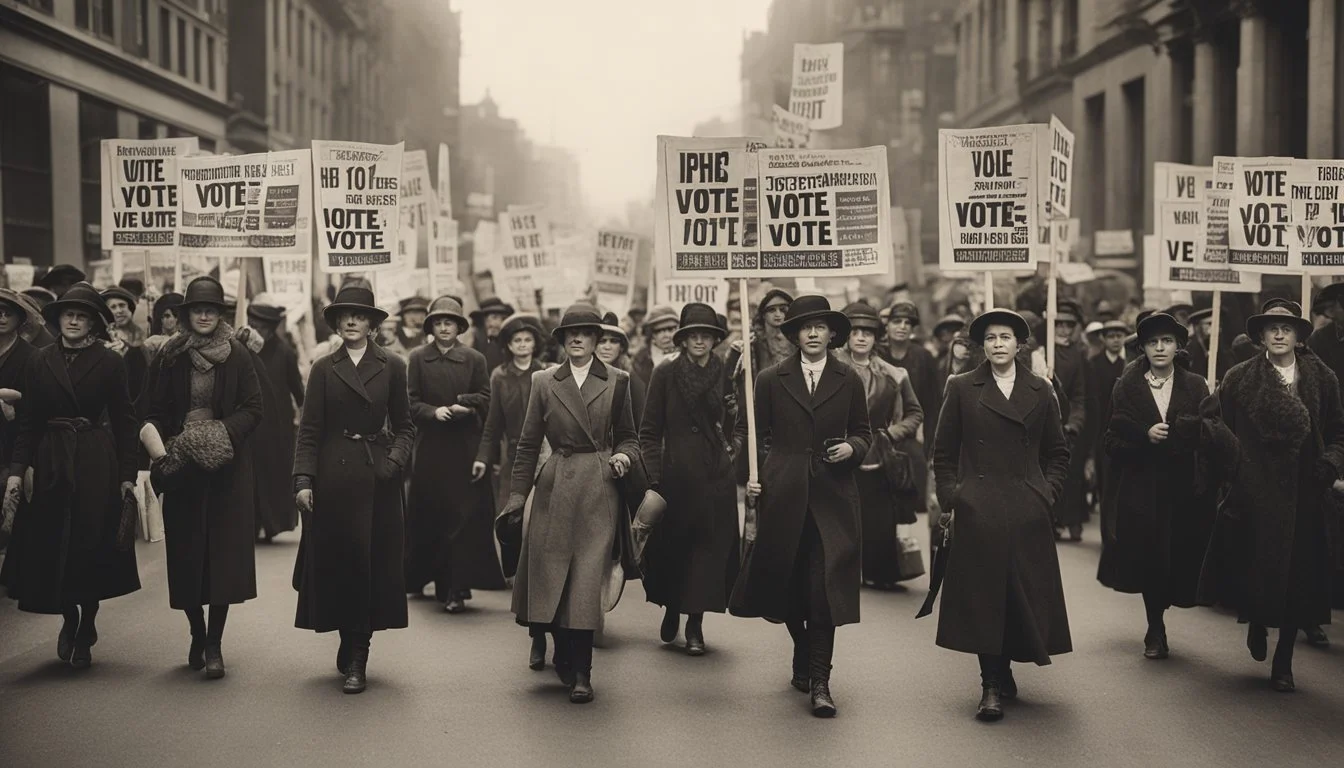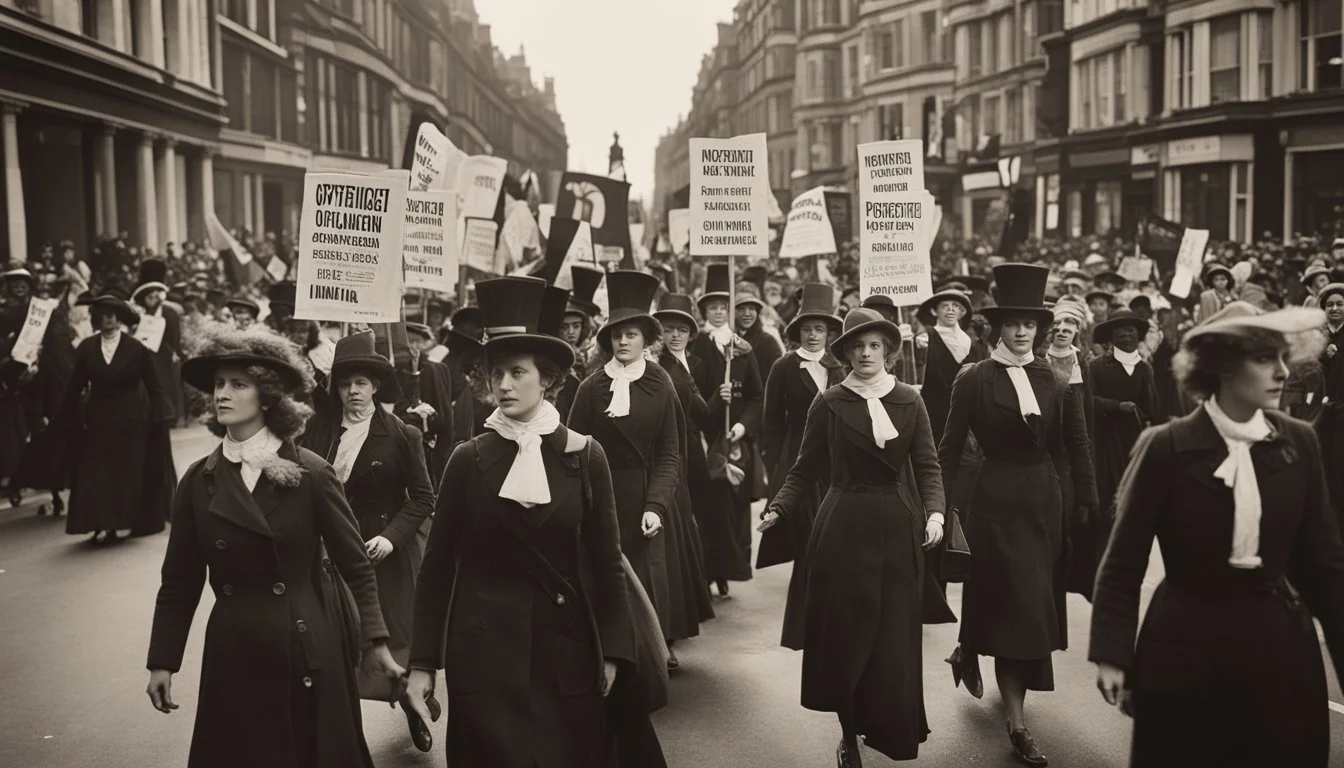6 Documentaries about the Suffragettes
Essential Viewing for History Enthusiasts
The struggle for women's suffrage was a pivotal movement in history, spearheaded by brave individuals demanding equal voting rights. Highlighting this formidable campaign, numerous documentaries delve into the sacrifices, obstacles, and triumphs experienced by the suffragettes.
These documentaries provide invaluable insights into how these women mobilized, protested, and ultimately changed the course of history by securing the right to vote. By exploring these films, viewers gain a deeper appreciation of the tenacity and resilience demonstrated by these trailblazers in the face of adversity.
1) Iron Jawed Angels (2004)
"Iron Jawed Angels" is a historical drama film directed by Katja von Garnier. Released in 2004, this HBO original movie recounts the powerful and inspiring story of the women's suffrage movement in the United States.
The film stars Hilary Swank as Alice Paul and Frances O'Connor as Lucy Burns. Both women played crucial roles in the fight for women’s voting rights. Through their relentless efforts in Washington, DC, they aimed to secure the 19th Amendment.
Set during the Suffrage Era, "Iron Jawed Angels" highlights the struggles and sacrifices suffragists endured. It showcases their strategic campaigns and protests that were essential in achieving their goals.
The movie received critical acclaim after its premiere at the 2004 Sundance Film Festival. Viewers get an in-depth look at the determination and resilience of these activists.
For further details about "Iron Jawed Angels," visit IMDb.
2) Suffragette (2015)
"Suffragette" is a 2015 historical drama film directed by Sarah Gavron. It stars Carey Mulligan, Helena Bonham Carter, and Meryl Streep.
The film is set in early 20th century Britain and follows the story of the Women's Social and Political Union's militant campaign for women's suffrage.
Carey Mulligan plays Maud Watts, a fictional working-class laundress whose life is transformed by her involvement in the suffrage movement.
The narrative captures the tension between the peaceful suffragists and the radical suffragettes. It highlights the personal and collective struggles they faced.
The depiction of brutal force-feeding, police brutality, and societal backlash is intense and historically grounded.
Helena Bonham Carter portrays Edith Ellyn, a composite character inspired by real-life suffragettes. The film emphasizes the sacrifices made by these women and their resilience.
Meryl Streep's brief but impactful role as Emmeline Pankhurst gives a face to the movement's leadership.
For more, see Suffragette on IMDb.
3) Suffrage: The Women Who Won The Vote
"Suffrage: The Women Who Won The Vote" provides an in-depth look at the determined efforts of British women in securing the right to vote. It takes the audience through a critical period in history leading up to 1918, when women over 30 who owned property were first allowed to vote in the UK.
The documentary sheds light on the multifaceted struggle that went beyond well-known figures like the Pankhurst family. It also details lesser-known aspects of the movement, including the contributions of working-class women and the hardships they faced.
This dramatized documentary combines factual information with reenactments, bringing to life the intense and poignant moments of the suffrage movement. It's an insightful resource for anyone interested in understanding the complex path toward women's voting rights in Britain.
For more information, visit IMDb.
4) No Man Shall Protect Us (2018)
The documentary "No Man Shall Protect Us" sheds light on the lesser-known aspect of the suffragette movement in England during 1913/14.
It reveals how the most radical women's rights activists formed a secret society to protect their fellow suffragettes from harm and arrest.
These brave women, known as The Bodyguard, trained in martial arts and carried concealed weapons.
Directed by Kathrynne Wolf and Tony Woolf, the documentary spans 50 minutes and explores the various tactics employed by these women, including evasion and deception.
It is a powerful portrayal of their courage and ingenuity. The film was written, co-produced, and co-directed by Tony Wolf, who is also known for his work on "Bartitsu: The Lost Martial Art of Sherlock Holmes."
The documentary is available on platforms like Vimeo and offers an essential look into the extraordinary measures some suffragettes took to ensure their safety and continue their fight for rights.
For more information, visit IMDB.
5) Shoulder to Shoulder (1974)
"Shoulder to Shoulder" is a BBC television mini-series that aired in 1974. This drama series focuses on the lives of the Pankhurst family and their pivotal role in the Suffragette Movement.
The series was created by Georgia Brown, Verity Lambert, and Midge Mackenzie and was broadcast on BBC2.
Featuring six episodes, the series stars Siân Phillips, Patricia Quinn, and Angela Down.
Each episode highlights key events and figures in the women’s suffrage movement, offering a dramatized yet insightful look into the struggles and achievements of the activists.
For more information, you can visit the IMDb page.
6) Make More Noise! Suffragettes in Silent Film (2015)
"Make More Noise! Suffragettes in Silent Film" is a 2015 compilation of early 20th-century footage. The British Film Institute (BFI) created the documentary to showcase how the suffragette movement was portrayed in silent films. The selection includes both serious and comedic takes on the women's suffrage movement.
This documentary features a mix of documentary footage and silent cinema. Clips from British newsreels and films from 1913 to 1917 highlight the public activities and protests of the suffragettes. Some segments also contain comedy films from the era, which push social boundaries and reflect the changing attitudes toward women.
Musician Lillian Henley specially composed and performed the music accompanying these silent films. This adds another layer of historical authenticity and emotional depth to the footage. Each film provides contemporary viewers with insight into the challenges and societal perceptions that suffragettes faced at the time.
"Make More Noise! Suffragettes in Silent Film" offers a unique lens through which to view the suffragette movement. It captures the essence of their struggle and showcases the different ways their cause was represented on screen. For further information, you can visit the BFI Website.
Historical Context of the Suffragette Movement
The Suffragette Movement, a pivotal struggle for women's voting rights, originated in the mid-19th century and saw significant contributions from numerous dedicated individuals. This section will explore the early seeds of the movement and highlight key figures who played essential roles in its progress.
Early Beginnings
The Suffragette Movement began in the mid-1800s, primarily in Western nations like the United States and United Kingdom. Early activists argued that women should have the same civic responsibilities and rights as men. Influential events, such as the Seneca Falls Convention in 1848, marked the formal start of organized activism.
In the UK, the efforts gained momentum with the establishment of groups like the Langham Place Circle and the National Society for Women's Suffrage. Initially focused on lobbying for legal reforms, these organizations utilized petitions, public speeches, and peaceful protests. Although progress was slow, these early efforts laid the groundwork for more aggressive and militant tactics adopted later.
Key Figures and Their Contributions
Several key figures were instrumental in advancing the Suffragette Movement. Emmeline Pankhurst, one of the most famous activists, founded the Women's Social and Political Union (WSPU) in the UK. Known for its militant tactics, the WSPU was pivotal in keeping suffrage in the public eye.
In the United States, figures like Susan B. Anthony and Elizabeth Cady Stanton were significant. Anthony's tireless activism, including her role in forming the National Woman Suffrage Association, was crucial. Stanton's work in drafting the Declaration of Sentiments was a foundational document for the movement.
The efforts of these figures, along with those of many others, helped to eventually secure women's right to vote in various countries, showcasing their immense dedication and influence.
Impact of the Suffragette Movement on Modern Society
The suffragette movement has had a profound and lasting impact on modern society, driving major legal and social reforms and leaving a continuing legacy that inspires contemporary feminist activism.
Legal and Social Milestones
The suffragette movement achieved significant legal milestones. The most notable was the ratification of the 19th Amendment in 1920, granting American women the right to vote. This legislative success was echoed globally as various countries followed suit, recognizing women's voting rights.
This legal recognition sparked further reforms. Women's rights in education, employment, and property ownership saw progressive changes. Legal structures supporting equal pay and reproductive rights also trace their roots to the suffragette movement. The intersection of these legal advancements has contributed to shaping a more equitable society.
Continuing Legacy
The legacy of the suffragette movement continues to resonate. Modern feminist movements draw inspiration from the courage and perseverance of early suffragettes. Issues like gender-based violence, workplace discrimination, and political representation are all areas where today's activists channel the spirit of suffrage pioneers.
Organizations such as the International Alliance of Women (IAW), which historically campaigned for women's suffrage, now work toward broader gender equality goals. The conceptual frameworks and organizational strategies developed by suffragettes remain foundational in contemporary advocacy, ensuring that their fight for equality remains relevant in today's world.




